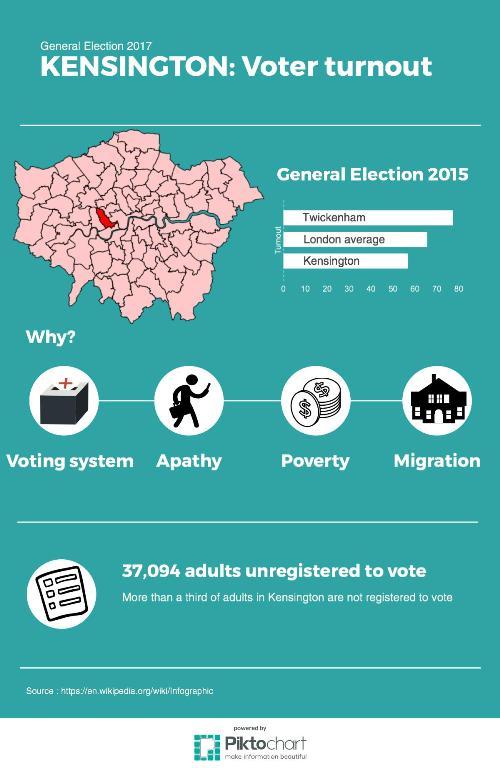Kensington has one of the lowest voter turnout rates in the country, with more than a third expected not to vote next week.
Tens of thousands of eligible adults in the constituency will miss out on polling day with figures revealing there are more than 37,000 unregistered residents in the area.
The data from the Office for National Statistics predicts Kensington to be one of the worst in the country for turnout tomorrow.
The research shows just 61% of the estimated voting age population are registered to vote – only Westminster and the City of London has a lower rate of turnout.
It continues a trend of the borough appearing at the bottom of rankings for electoral participation in London.
At the last general election less than 57% of eligible adults voted, compared to 66% nationally.
In 2010 it was even lower, with its 53% turnout the lowest in London.
When asked why this might be, some residents suggested the seat’s predictability – it has a returned a Tory MP since its creation in 1974 – fuels apathy among voters.
Pensioner Victor, said: “If you put up a pig and it was Conservative in this borough you would get elected. “So a lot of people don’t vote because there’s not much point in it.”
Another voter, Alice, said: “The people here – their lifestyle is not going to change regardless of who is in power.”
But despite its reputation as one of London’s wealthiest hotspots, Kensington is a diverse constituency.

While the borough has some of the most upmarket postcodes in the capital there are also dense areas of social housing and high levels of deprivation in parts of the constituency.
Another resident, Bridget, suggested high levels of migration in the area might affect turnout.
“There’s a lot of transient people who live around here,” she said.
“And a lot of people who are quite poor in this area, because it is housing trust places, and I think they are not interested.”
Kensington migrant population is high, with 40% of residents born abroad compared to just 13% nationally – of these 37% are not UK citizens.
Changes to the voter registration system in 2015, which resulted in hundreds of thousands of people dropping off the electoral register, also tend to have a greater impact in areas with higher proportions of migrants.




